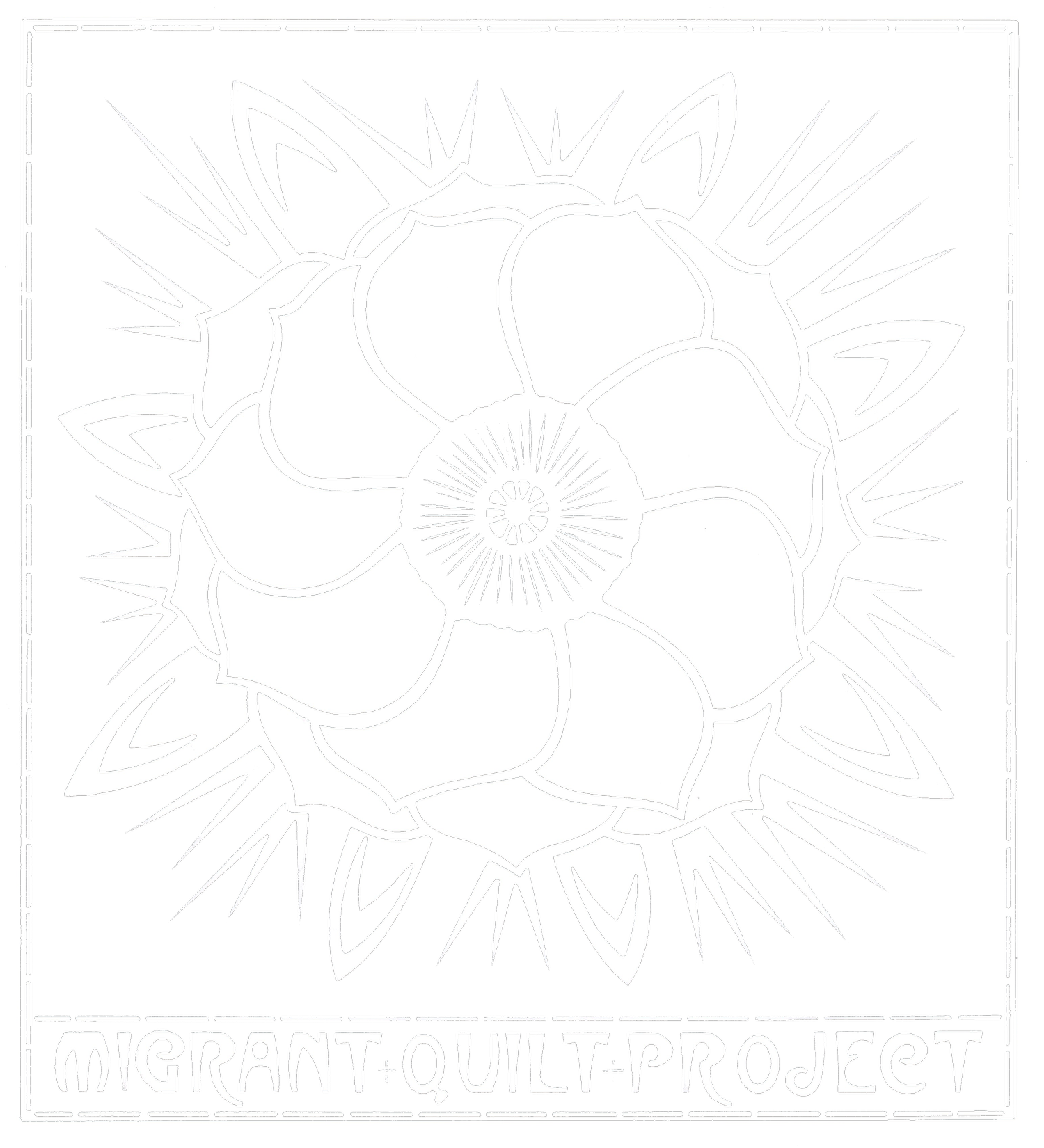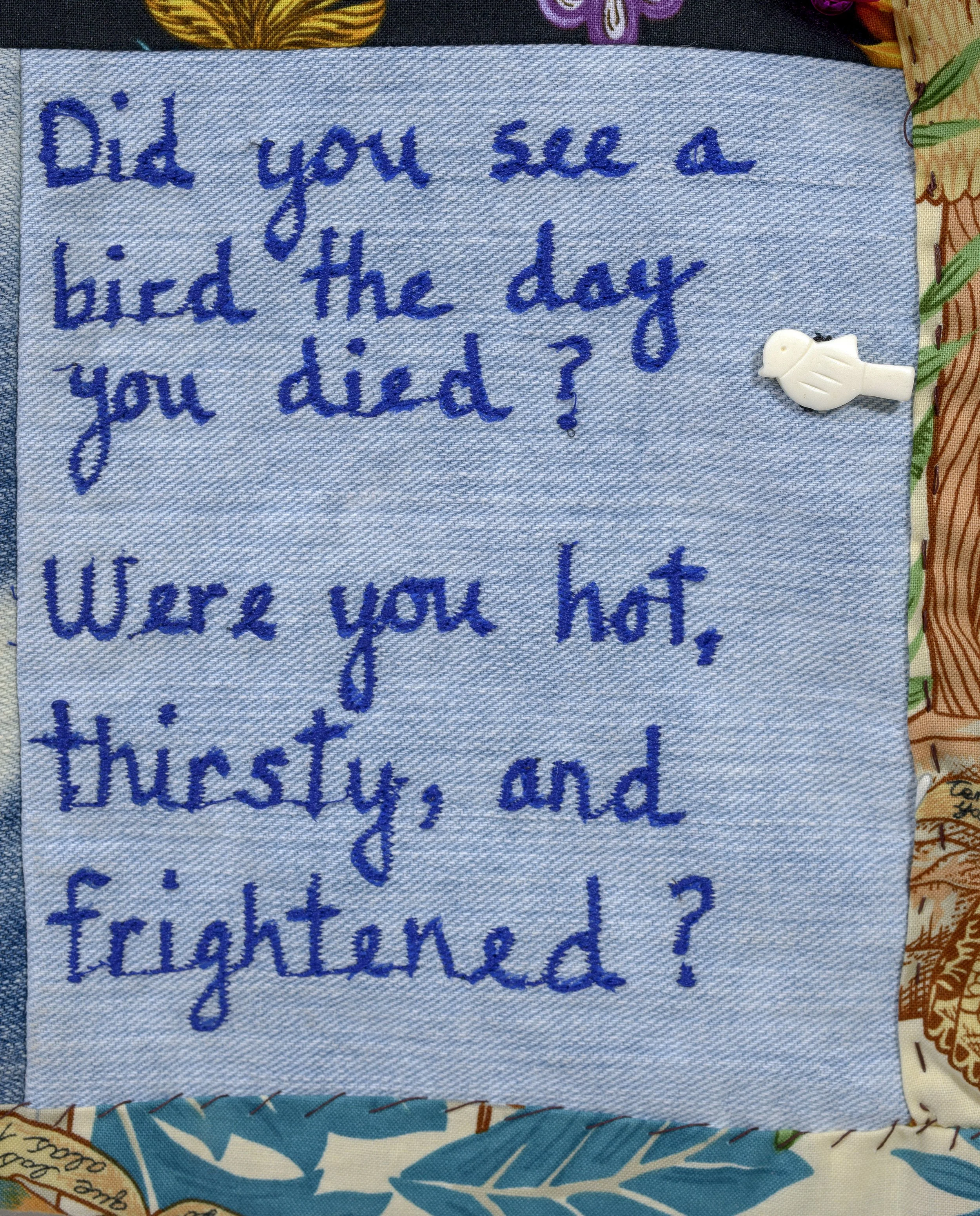About The Migrant Quilt Project
Between 2004 and 2005, a record number of 282 migrants perished in the Tucson Sector, the border region between New Mexico and Yuma. The increase in deaths moved Jody Ipsen to take action to alleviate the tragic loss of life. As she hiked remote migrant trails with fellow humanitarians, they collected clothing, cans and water bottles left behind by migrants. Initially, they recycled some items and threw away the dirty clothes until Jody realized that the textile-based discards could be used to make quilts to communicate the reality of migrants’ deaths. She reached out to quiltmakers and artists to create quilts from the blue jeans, bandanas, work shirts and embroidered cloths she gathered in the desert. Quilts would represent deaths from each year since 2000 when the Pima County Medical Examiner’s Office began documenting the names of deceased migrants.
In 2020, the Arizona Historical Society received the Migrant Quilt Project Quilts into their collections. We are incredibly grateful for their support in preserving and exhibiting these quilts and ensuring access to the project for future generations. The quilts are housed and on rotating display at the Arizona History Museum in Tucson, Arizona.
The Migrant Quilts carry the stories of those who died so that viewers of the quilts may understand the real, personal, and fatal results of inhumane policies, including NAFTA, CAFTA, Operation Gatekeeper, Safeguard, and Hold the Line.
While immigration into the United States from its southern neighbors has slowed in recent years, the deaths continue to occur as migrants are forced to cross the border into more remote and dangerous areas.
Detail from Tucson Sector 2010-2011 by Cornelia Bayley
Frequently Asked Questions
What does Desconocido/a mean?
Desconocido/a translates to “unknown.” Often, many of the migrants who perish in the desert remain unknown because many do not carry identification or their bodies are found in such morbid condition that they can’t be identified. Unless they have distinguishable markings, clothing, jewelry or shoes, families cannot be sure that their loved one was found. Hundreds of unidentified persons are yet to be reunited to their home countries because of these reasons.
Do you recycle all the items found at the lay-up sites?
While we try to recycle as much material as possible, we never use any undergarments, moldy clothes, heavily soiled or items that have been eroded from the harsh sun or weather conditions.
We never use clothing from a nearby site where someone was found dead. Many of us who work with migrants in the desert have come across a deceased person. It is critical that these sites are preserved for the Medical Examiner and for the person’s family. These sites are sacred.
Often we find identification, airline and bus tickets that have been left behind by migrants. We turn those items over to the country of origin’s consulate. It is important that the consulates are notified incase this person has been documented as missing.
Plastics, glass and tin cans are recycled at local recycling containers.
Are these items cleaned and how?
We go to great lengths to clean the clothes thoroughly. Incidentally, ultraviolet radiation (UV-C) replicates a natural purification system by destroying microbes living in the clothing items. However, that alone is not enough. We wash the items thoroughly. Those clothes in good condition are used to create Migrant Quilts.
Why do you do this work?
We are deeply concerned about the loss of lives that are the direct result of United States policies including Prevention through Deterrence, Operation Gatekeeper, Operation Safeguard and others. In the Tucson sector alone, over 4,000 migrant deaths have been recorded since 2000. It is generally understood that, due to the hostile environmental conditions that migrants face, an inestimable number of migrant deaths are never documented. Although we can never know the true human cost of US border policy, we hope that our quilts can honor the dead and raise awareness about the realities of migration.
How many people work for the project?
That’s a great question. There are no employees or paid staff. We are all volunteers donating our time, talent and energy to run the project. Volunteers do various duties such as quilt, some do desert clean-ups, some process email requests, and some do the laundry. Douglas High School’s English Language Learners embroidered quilt squares. We encourage everyone to get involved through your schools, communities, churches, quilting groups, and all other social or humanitarian programs.
Ask us how you can be a part of this vital cooperative by emailing us.

